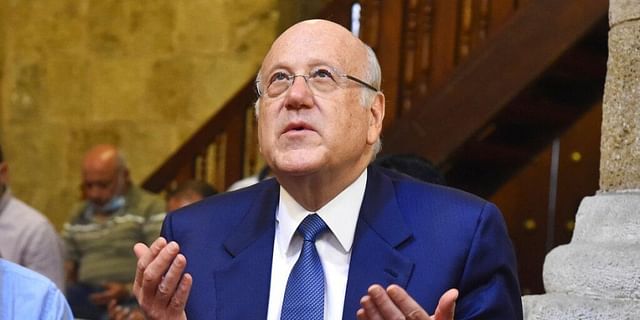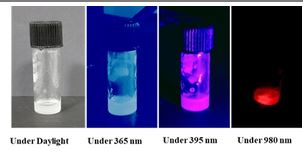 BEIRUT: Lebanon’s new Prime Minister Najib Mikati pledged Friday to gain control of one of the world’s worst economic meltdowns, saying lifting subsidies would be critical for the small country’s government formed after a year of political stalemate.
BEIRUT: Lebanon’s new Prime Minister Najib Mikati pledged Friday to gain control of one of the world’s worst economic meltdowns, saying lifting subsidies would be critical for the small country’s government formed after a year of political stalemate.
Holding back tears, Mikati, one of the richest men in the country, said he recognized the pain of Lebanese mothers who cannot feed their children or find aspirin to ease their ailments, as well as to students whose parents can no longer afford to send them to school.
“The situation is difficult but not impossible to deal with if we cooperate,” Mikati told reporters at the presidential palace, where the new government line-up was announced.
Lebanon has been without a fully empowered government since the catastrophic Aug. 4, 2020 explosion at Beirut port, which forced the resignation of then Prime Minister Hassan Diab’s government. An economic meltdown unfolding since 2019 has been made worse by the deadlock among rival political groups— who bickered over distribution of power and roles in the new government.
The new government faces a mammoth task that few believe can be surmounted, including undertaking critically needed reforms. Among its first tasks will be managing public anger and tensions resulting from the lifting of fuel subsidies expected by the end of the month.
Lebanon’s foreign reserves have been running dangerously low, and the central bank in the import-dependent country said it is no longer able to support the country’s $6 billion subsidy program.
The government is also expected to overseeing a financial audit of the Central Bank, and resume negotiations with the International Monetary Fund for a rescue package.
The agreement breaks a 13-month deadlock that saw the country slide deeper into financial chaos and poverty over the past year.
A date for parliament to convene to approve the government and its plan has not yet been announced.
The new Cabinet of 24 ministers headed by Mikati, a billionaire businessman, was announced by the president’s office and later by the Secretary-General of the Council of Ministers, Mahmoud Makkieh. Ministers were handpicked by the same politicians who have ruled the country for the past decades, blamed by many for the corruption and mismanagement that led to the country’s current crisis.
Many members of the new Cabinet are experts in their fields, including Firas Abiad, director general of the Rafik Hariri University Hospital, the public hospital leading the coronavirus fight. Abiad, who has won praise for his transparency in handling the pandemic, was named health minister. A top Central Bank official, Youssef Khalil, was appointed as finance minister, and Bassam Mawlawi, a judge, is the new interior minister.
The new Cabinet is also expected to oversee general elections scheduled for next year.
Mikati, who hails from the impoverished northern city of Tripoli, was tasked with forming a new government in July. He was twice prime minister – in 2005 and again from 2011 to 2013 – and is widely considered to be part of the same political class that brought the country to bankruptcy.
“I hope we can fulfill people’s aspirations and at least stop the collapse,” he said Friday. He said the government will launch a rescue plan for the country.
It was not immediately clear what sudden compromise resulted in the breakthrough Friday. The announcement of a new government comes after renewed U.S. and French pressure to form a Cabinet as Lebanon’s economic unraveling reached a critical point that risked a social explosion. Crippling shortages in fuel and medicine threatened to shut down hospitals, bakeries and the country’s internet and caused friction, sometimes violence, in long queues to fill up vehicles.
The currency has lost 90 percent of its value to the dollar since October 2019, driving hyperinflation and plunging more than half the population in poverty.
Salem Zahran, a Lebanese journalist and political analyst, said a new government provides a “dose of oxygen” for Lebanese whose lives have been upended by the crisis.
“A positive shock has happened, but we have to see how the government will work, and how they will negotiate with the IMF,” Zahran said.
In the hours since the government formation, the national currency gained strength in the black market, rising to 15,000 to the dollar down from 19,000.
Mikati became a favorite for the post earlier this year after he was endorsed by most of Lebanon’s political parties, including the powerful Iran-backed militant Hezbollah group and the other major Shiite party, Amal, led by Parliament Speaker Nabih Berri. Mikati was also endorsed by former Sunni prime ministers including former Prime Minister Saad Hariri, who abandoned efforts to form a government earlier this year after failing for over eight months to agree with President Michel Aoun on the Cabinet’s makeup.
The international community has refused to help Lebanon financially before wide reforms are implemented to fight widespread corruption and mismanagement.
Alain Aoun, a member of parliament representing the largest Christian block close to the Lebanese president, said international pressure and “signals” from the Americans and the Iranians that they have no conditions or reservations over the shape of the government accelerated an agreement between the internal rival parties.
“The American message was really pushing forward for the government to be formed,” he said, while the same message came from Iran’s president in a phone call with French President Emmanuel Macron.

























